NURS1007 - Mental Health Case Study: An Analysis of Mary's Depression
VerifiedAdded on 2023/06/04
|11
|3199
|270
Case Study
AI Summary
This case study comprehensively analyzes Mary, a 41-year-old woman experiencing depression, detailing her symptoms such as feelings of worthlessness, hopelessness, lack of motivation, and sleep difficulties. It explores the signs and symptoms of depression for accurate diagnosis, emphasizing the importance of differentiating it from other medical conditions. The study highlights the connection between mental and physical health, discussing how mental health impacts physical well-being and vice versa. Furthermore, it outlines various intervention strategies for recovery, including medical treatment, family support, building trusting relationships, and the importance of nutrition and diet. The implications for health professionals are also addressed, stressing the need for awareness and understanding of mental disorders to provide quality care. This document is available on Desklib, a platform offering a wide array of study tools and solved assignments for students.
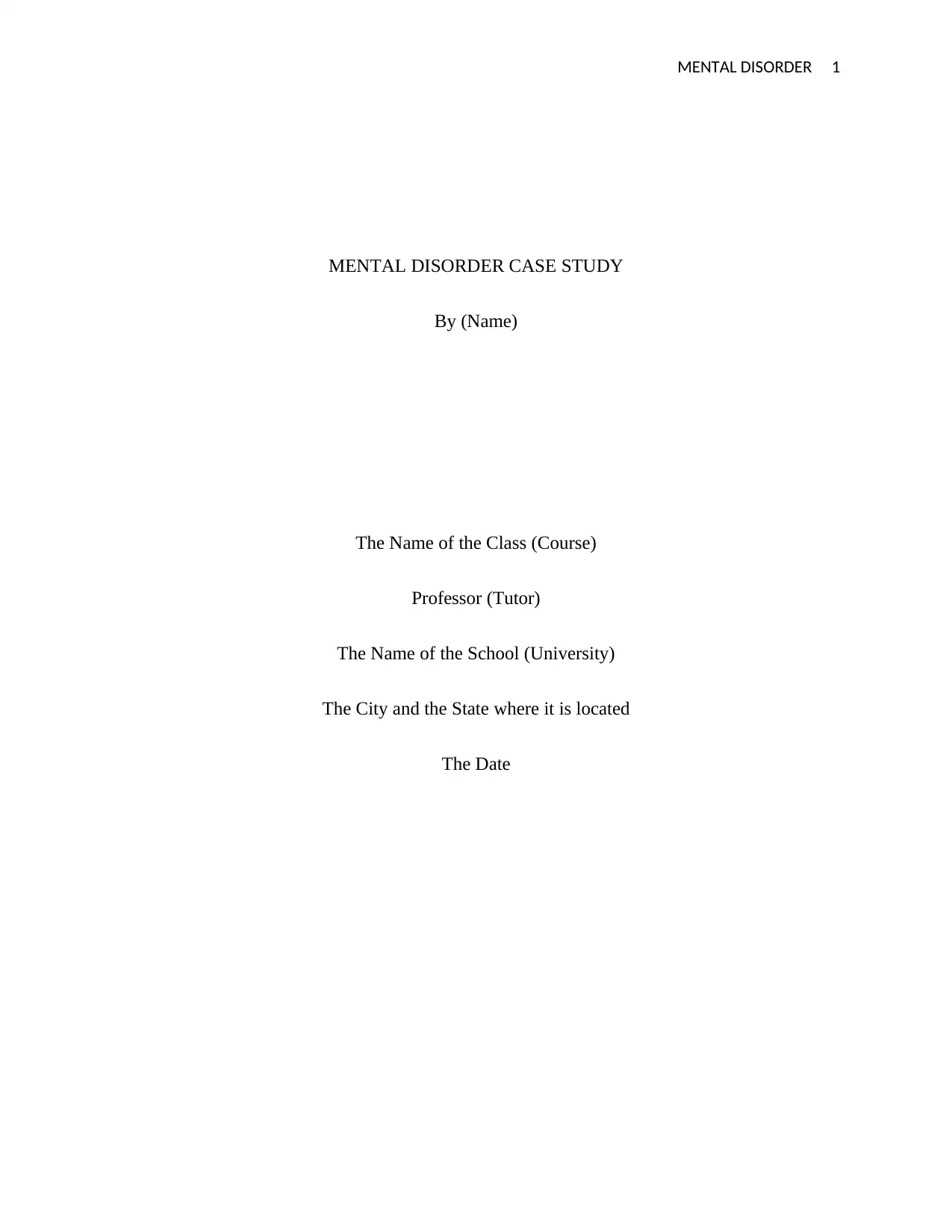
MENTAL DISORDER 1
MENTAL DISORDER CASE STUDY
By (Name)
The Name of the Class (Course)
Professor (Tutor)
The Name of the School (University)
The City and the State where it is located
The Date
MENTAL DISORDER CASE STUDY
By (Name)
The Name of the Class (Course)
Professor (Tutor)
The Name of the School (University)
The City and the State where it is located
The Date
Paraphrase This Document
Need a fresh take? Get an instant paraphrase of this document with our AI Paraphraser
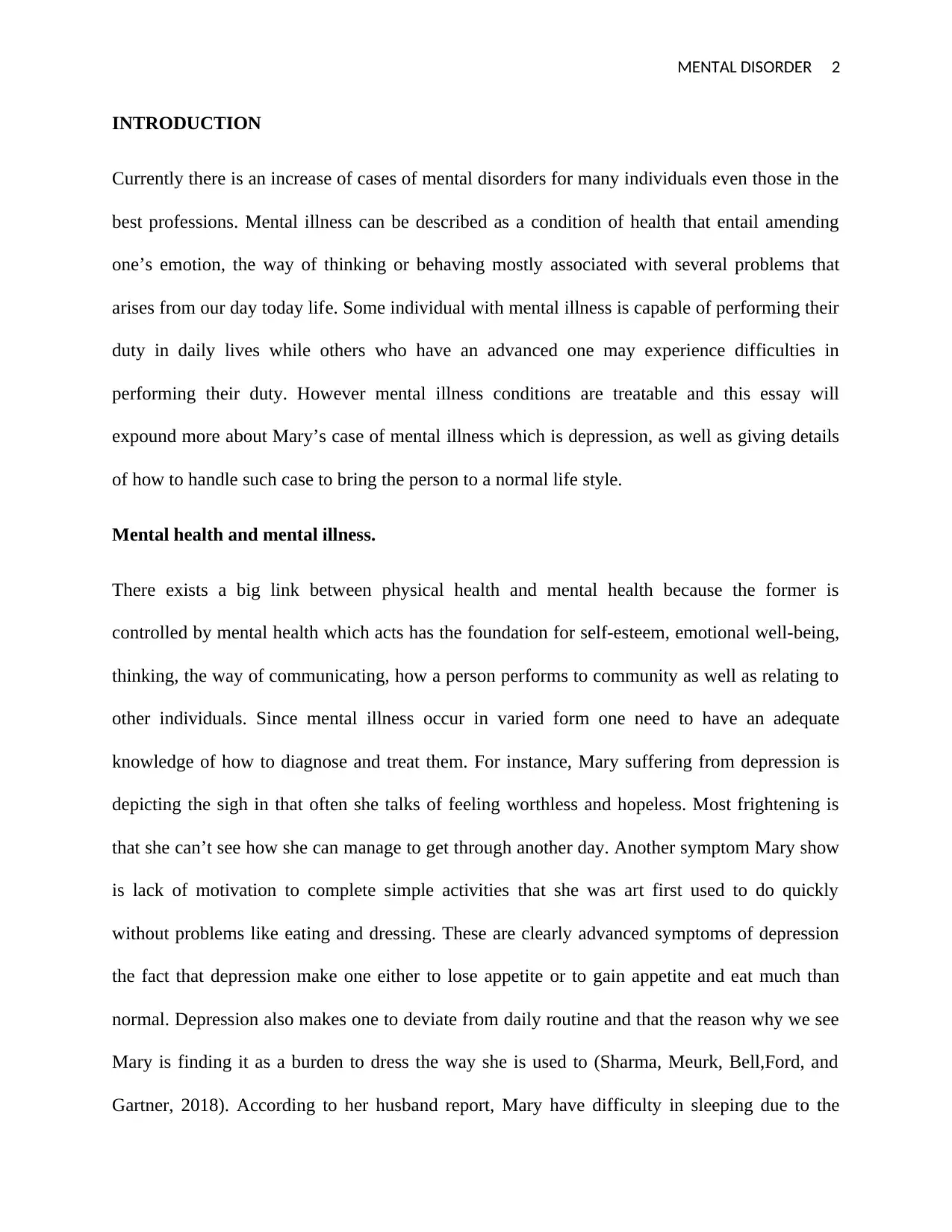
MENTAL DISORDER 2
INTRODUCTION
Currently there is an increase of cases of mental disorders for many individuals even those in the
best professions. Mental illness can be described as a condition of health that entail amending
one’s emotion, the way of thinking or behaving mostly associated with several problems that
arises from our day today life. Some individual with mental illness is capable of performing their
duty in daily lives while others who have an advanced one may experience difficulties in
performing their duty. However mental illness conditions are treatable and this essay will
expound more about Mary’s case of mental illness which is depression, as well as giving details
of how to handle such case to bring the person to a normal life style.
Mental health and mental illness.
There exists a big link between physical health and mental health because the former is
controlled by mental health which acts has the foundation for self-esteem, emotional well-being,
thinking, the way of communicating, how a person performs to community as well as relating to
other individuals. Since mental illness occur in varied form one need to have an adequate
knowledge of how to diagnose and treat them. For instance, Mary suffering from depression is
depicting the sigh in that often she talks of feeling worthless and hopeless. Most frightening is
that she can’t see how she can manage to get through another day. Another symptom Mary show
is lack of motivation to complete simple activities that she was art first used to do quickly
without problems like eating and dressing. These are clearly advanced symptoms of depression
the fact that depression make one either to lose appetite or to gain appetite and eat much than
normal. Depression also makes one to deviate from daily routine and that the reason why we see
Mary is finding it as a burden to dress the way she is used to (Sharma, Meurk, Bell,Ford, and
Gartner, 2018). According to her husband report, Mary have difficulty in sleeping due to the
INTRODUCTION
Currently there is an increase of cases of mental disorders for many individuals even those in the
best professions. Mental illness can be described as a condition of health that entail amending
one’s emotion, the way of thinking or behaving mostly associated with several problems that
arises from our day today life. Some individual with mental illness is capable of performing their
duty in daily lives while others who have an advanced one may experience difficulties in
performing their duty. However mental illness conditions are treatable and this essay will
expound more about Mary’s case of mental illness which is depression, as well as giving details
of how to handle such case to bring the person to a normal life style.
Mental health and mental illness.
There exists a big link between physical health and mental health because the former is
controlled by mental health which acts has the foundation for self-esteem, emotional well-being,
thinking, the way of communicating, how a person performs to community as well as relating to
other individuals. Since mental illness occur in varied form one need to have an adequate
knowledge of how to diagnose and treat them. For instance, Mary suffering from depression is
depicting the sigh in that often she talks of feeling worthless and hopeless. Most frightening is
that she can’t see how she can manage to get through another day. Another symptom Mary show
is lack of motivation to complete simple activities that she was art first used to do quickly
without problems like eating and dressing. These are clearly advanced symptoms of depression
the fact that depression make one either to lose appetite or to gain appetite and eat much than
normal. Depression also makes one to deviate from daily routine and that the reason why we see
Mary is finding it as a burden to dress the way she is used to (Sharma, Meurk, Bell,Ford, and
Gartner, 2018). According to her husband report, Mary have difficulty in sleeping due to the
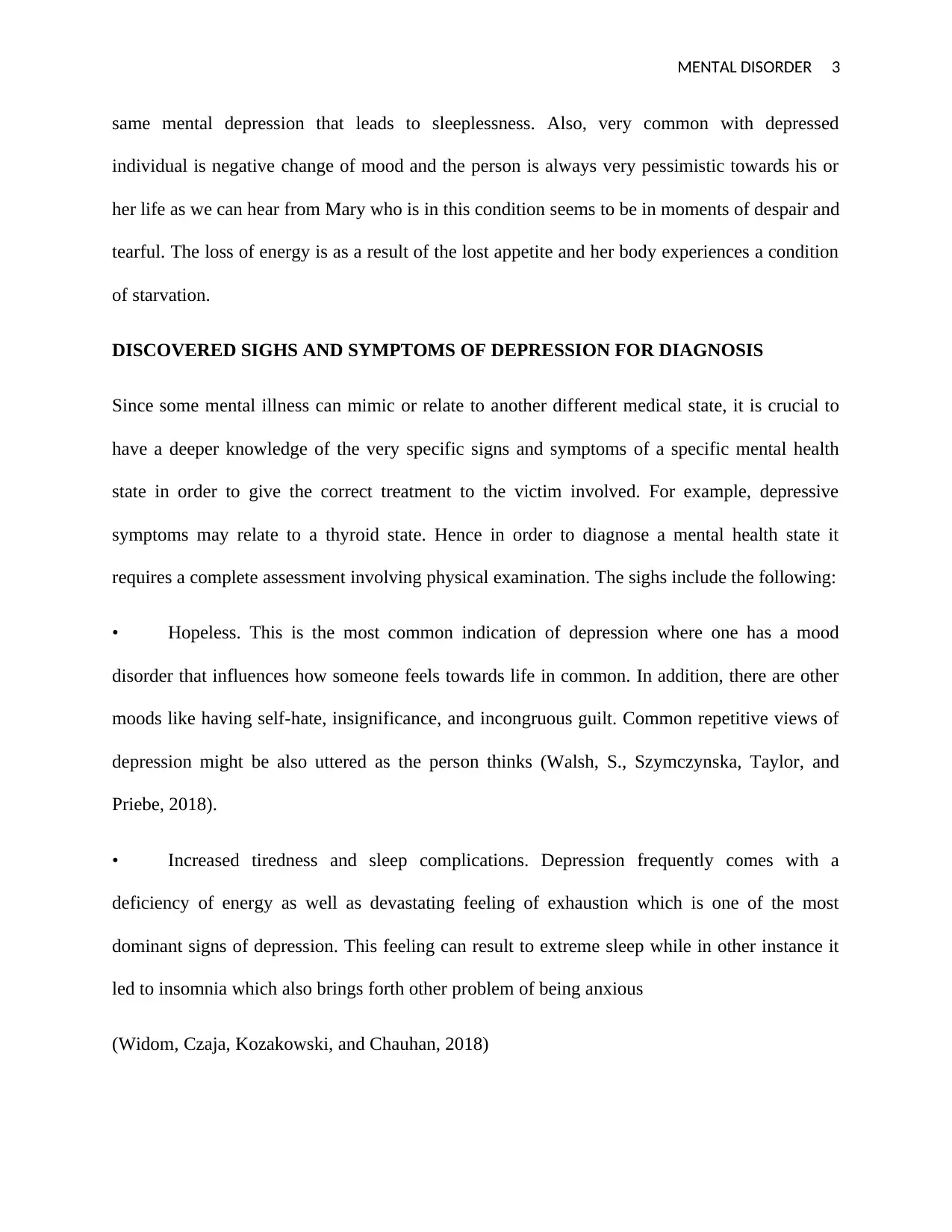
MENTAL DISORDER 3
same mental depression that leads to sleeplessness. Also, very common with depressed
individual is negative change of mood and the person is always very pessimistic towards his or
her life as we can hear from Mary who is in this condition seems to be in moments of despair and
tearful. The loss of energy is as a result of the lost appetite and her body experiences a condition
of starvation.
DISCOVERED SIGHS AND SYMPTOMS OF DEPRESSION FOR DIAGNOSIS
Since some mental illness can mimic or relate to another different medical state, it is crucial to
have a deeper knowledge of the very specific signs and symptoms of a specific mental health
state in order to give the correct treatment to the victim involved. For example, depressive
symptoms may relate to a thyroid state. Hence in order to diagnose a mental health state it
requires a complete assessment involving physical examination. The sighs include the following:
• Hopeless. This is the most common indication of depression where one has a mood
disorder that influences how someone feels towards life in common. In addition, there are other
moods like having self-hate, insignificance, and incongruous guilt. Common repetitive views of
depression might be also uttered as the person thinks (Walsh, S., Szymczynska, Taylor, and
Priebe, 2018).
• Increased tiredness and sleep complications. Depression frequently comes with a
deficiency of energy as well as devastating feeling of exhaustion which is one of the most
dominant signs of depression. This feeling can result to extreme sleep while in other instance it
led to insomnia which also brings forth other problem of being anxious
(Widom, Czaja, Kozakowski, and Chauhan, 2018)
same mental depression that leads to sleeplessness. Also, very common with depressed
individual is negative change of mood and the person is always very pessimistic towards his or
her life as we can hear from Mary who is in this condition seems to be in moments of despair and
tearful. The loss of energy is as a result of the lost appetite and her body experiences a condition
of starvation.
DISCOVERED SIGHS AND SYMPTOMS OF DEPRESSION FOR DIAGNOSIS
Since some mental illness can mimic or relate to another different medical state, it is crucial to
have a deeper knowledge of the very specific signs and symptoms of a specific mental health
state in order to give the correct treatment to the victim involved. For example, depressive
symptoms may relate to a thyroid state. Hence in order to diagnose a mental health state it
requires a complete assessment involving physical examination. The sighs include the following:
• Hopeless. This is the most common indication of depression where one has a mood
disorder that influences how someone feels towards life in common. In addition, there are other
moods like having self-hate, insignificance, and incongruous guilt. Common repetitive views of
depression might be also uttered as the person thinks (Walsh, S., Szymczynska, Taylor, and
Priebe, 2018).
• Increased tiredness and sleep complications. Depression frequently comes with a
deficiency of energy as well as devastating feeling of exhaustion which is one of the most
dominant signs of depression. This feeling can result to extreme sleep while in other instance it
led to insomnia which also brings forth other problem of being anxious
(Widom, Czaja, Kozakowski, and Chauhan, 2018)
⊘ This is a preview!⊘
Do you want full access?
Subscribe today to unlock all pages.

Trusted by 1+ million students worldwide
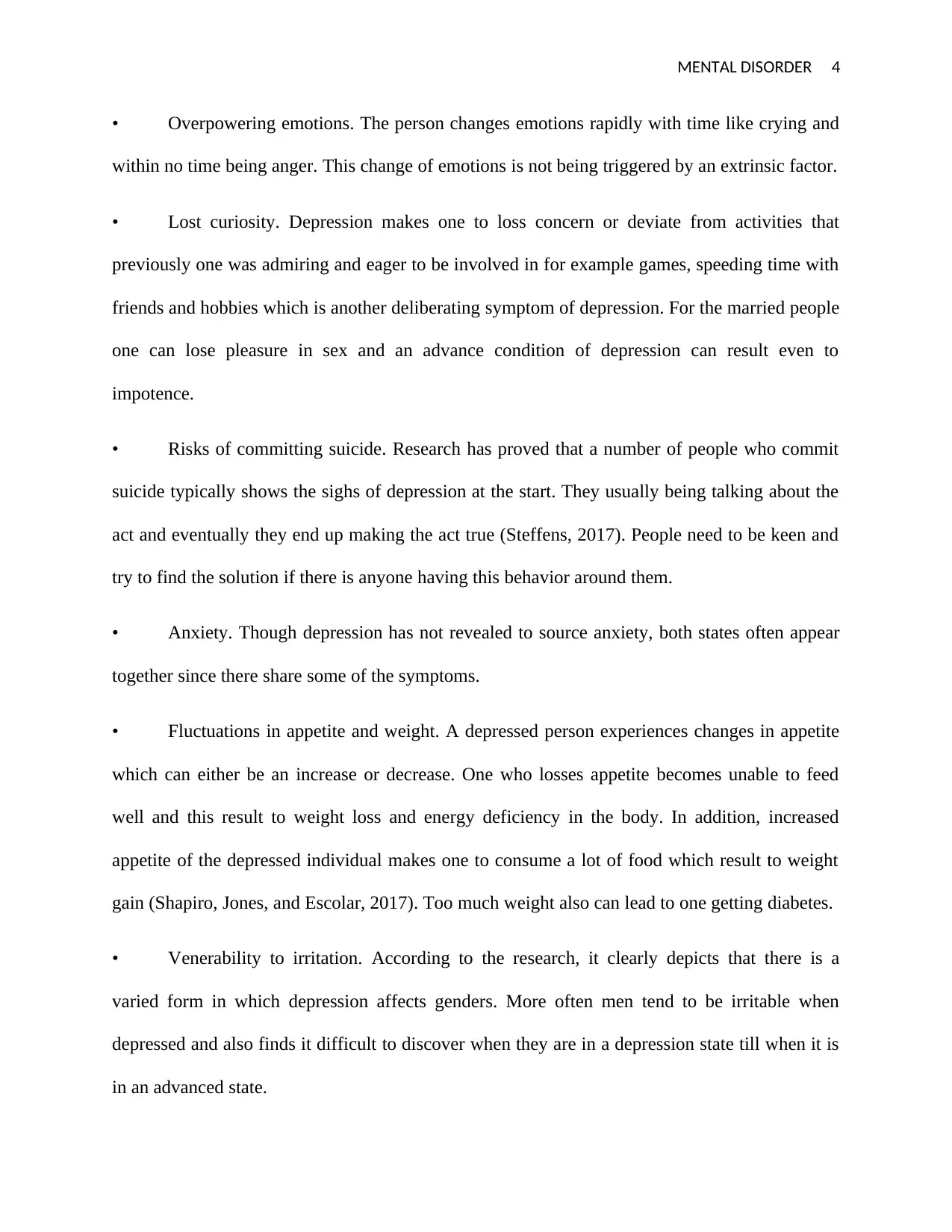
MENTAL DISORDER 4
• Overpowering emotions. The person changes emotions rapidly with time like crying and
within no time being anger. This change of emotions is not being triggered by an extrinsic factor.
• Lost curiosity. Depression makes one to loss concern or deviate from activities that
previously one was admiring and eager to be involved in for example games, speeding time with
friends and hobbies which is another deliberating symptom of depression. For the married people
one can lose pleasure in sex and an advance condition of depression can result even to
impotence.
• Risks of committing suicide. Research has proved that a number of people who commit
suicide typically shows the sighs of depression at the start. They usually being talking about the
act and eventually they end up making the act true (Steffens, 2017). People need to be keen and
try to find the solution if there is anyone having this behavior around them.
• Anxiety. Though depression has not revealed to source anxiety, both states often appear
together since there share some of the symptoms.
• Fluctuations in appetite and weight. A depressed person experiences changes in appetite
which can either be an increase or decrease. One who losses appetite becomes unable to feed
well and this result to weight loss and energy deficiency in the body. In addition, increased
appetite of the depressed individual makes one to consume a lot of food which result to weight
gain (Shapiro, Jones, and Escolar, 2017). Too much weight also can lead to one getting diabetes.
• Venerability to irritation. According to the research, it clearly depicts that there is a
varied form in which depression affects genders. More often men tend to be irritable when
depressed and also finds it difficult to discover when they are in a depression state till when it is
in an advanced state.
• Overpowering emotions. The person changes emotions rapidly with time like crying and
within no time being anger. This change of emotions is not being triggered by an extrinsic factor.
• Lost curiosity. Depression makes one to loss concern or deviate from activities that
previously one was admiring and eager to be involved in for example games, speeding time with
friends and hobbies which is another deliberating symptom of depression. For the married people
one can lose pleasure in sex and an advance condition of depression can result even to
impotence.
• Risks of committing suicide. Research has proved that a number of people who commit
suicide typically shows the sighs of depression at the start. They usually being talking about the
act and eventually they end up making the act true (Steffens, 2017). People need to be keen and
try to find the solution if there is anyone having this behavior around them.
• Anxiety. Though depression has not revealed to source anxiety, both states often appear
together since there share some of the symptoms.
• Fluctuations in appetite and weight. A depressed person experiences changes in appetite
which can either be an increase or decrease. One who losses appetite becomes unable to feed
well and this result to weight loss and energy deficiency in the body. In addition, increased
appetite of the depressed individual makes one to consume a lot of food which result to weight
gain (Shapiro, Jones, and Escolar, 2017). Too much weight also can lead to one getting diabetes.
• Venerability to irritation. According to the research, it clearly depicts that there is a
varied form in which depression affects genders. More often men tend to be irritable when
depressed and also finds it difficult to discover when they are in a depression state till when it is
in an advanced state.
Paraphrase This Document
Need a fresh take? Get an instant paraphrase of this document with our AI Paraphraser
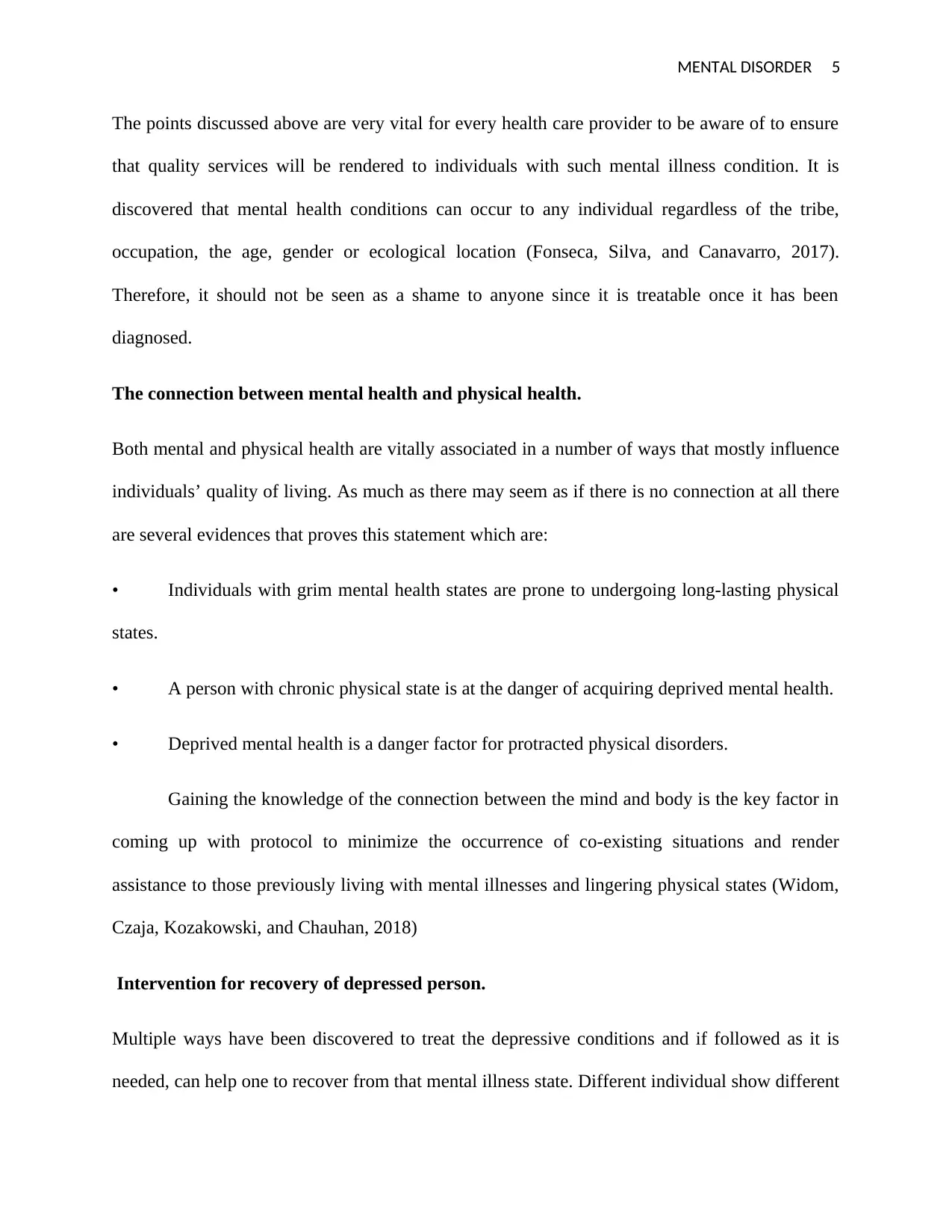
MENTAL DISORDER 5
The points discussed above are very vital for every health care provider to be aware of to ensure
that quality services will be rendered to individuals with such mental illness condition. It is
discovered that mental health conditions can occur to any individual regardless of the tribe,
occupation, the age, gender or ecological location (Fonseca, Silva, and Canavarro, 2017).
Therefore, it should not be seen as a shame to anyone since it is treatable once it has been
diagnosed.
The connection between mental health and physical health.
Both mental and physical health are vitally associated in a number of ways that mostly influence
individuals’ quality of living. As much as there may seem as if there is no connection at all there
are several evidences that proves this statement which are:
• Individuals with grim mental health states are prone to undergoing long-lasting physical
states.
• A person with chronic physical state is at the danger of acquiring deprived mental health.
• Deprived mental health is a danger factor for protracted physical disorders.
Gaining the knowledge of the connection between the mind and body is the key factor in
coming up with protocol to minimize the occurrence of co-existing situations and render
assistance to those previously living with mental illnesses and lingering physical states (Widom,
Czaja, Kozakowski, and Chauhan, 2018)
Intervention for recovery of depressed person.
Multiple ways have been discovered to treat the depressive conditions and if followed as it is
needed, can help one to recover from that mental illness state. Different individual show different
The points discussed above are very vital for every health care provider to be aware of to ensure
that quality services will be rendered to individuals with such mental illness condition. It is
discovered that mental health conditions can occur to any individual regardless of the tribe,
occupation, the age, gender or ecological location (Fonseca, Silva, and Canavarro, 2017).
Therefore, it should not be seen as a shame to anyone since it is treatable once it has been
diagnosed.
The connection between mental health and physical health.
Both mental and physical health are vitally associated in a number of ways that mostly influence
individuals’ quality of living. As much as there may seem as if there is no connection at all there
are several evidences that proves this statement which are:
• Individuals with grim mental health states are prone to undergoing long-lasting physical
states.
• A person with chronic physical state is at the danger of acquiring deprived mental health.
• Deprived mental health is a danger factor for protracted physical disorders.
Gaining the knowledge of the connection between the mind and body is the key factor in
coming up with protocol to minimize the occurrence of co-existing situations and render
assistance to those previously living with mental illnesses and lingering physical states (Widom,
Czaja, Kozakowski, and Chauhan, 2018)
Intervention for recovery of depressed person.
Multiple ways have been discovered to treat the depressive conditions and if followed as it is
needed, can help one to recover from that mental illness state. Different individual show different
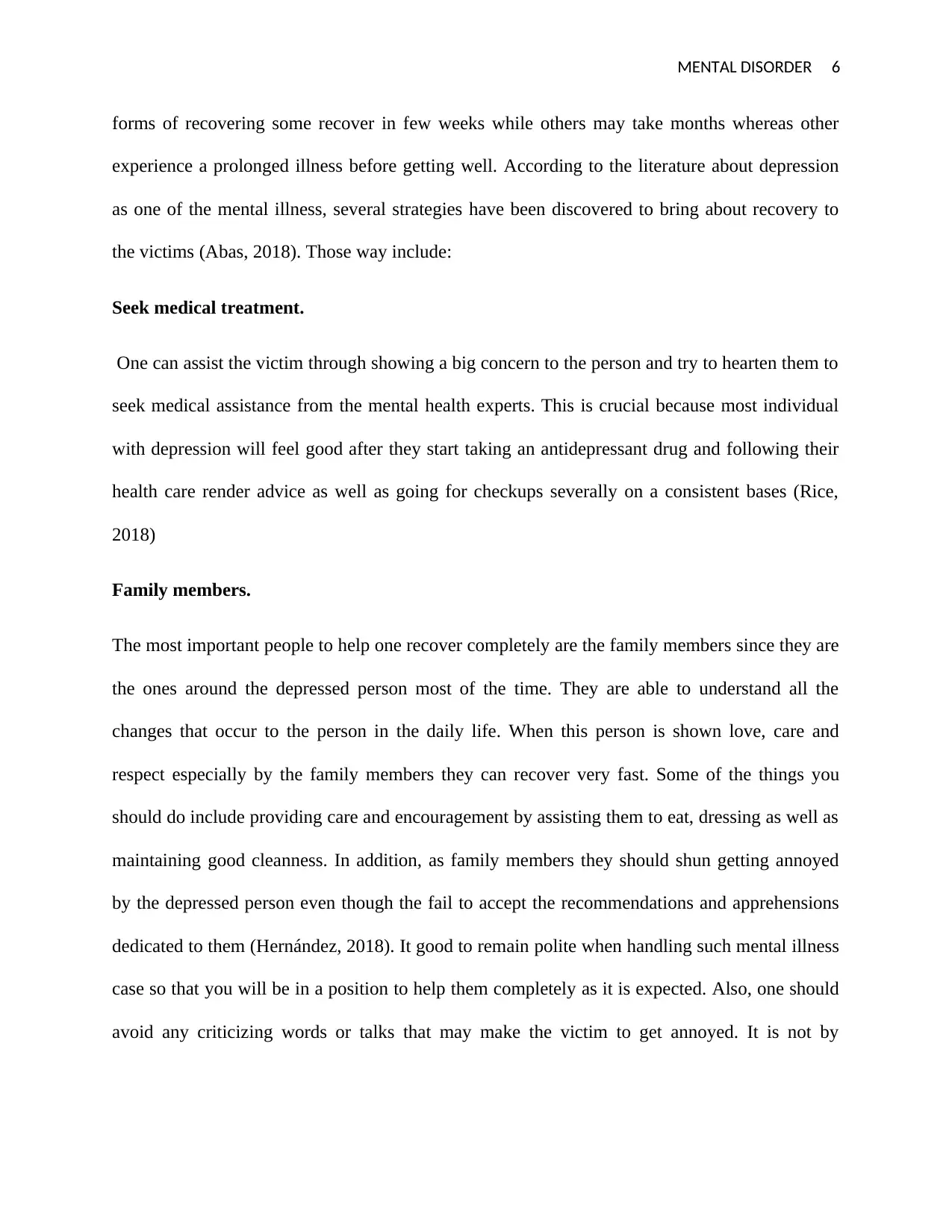
MENTAL DISORDER 6
forms of recovering some recover in few weeks while others may take months whereas other
experience a prolonged illness before getting well. According to the literature about depression
as one of the mental illness, several strategies have been discovered to bring about recovery to
the victims (Abas, 2018). Those way include:
Seek medical treatment.
One can assist the victim through showing a big concern to the person and try to hearten them to
seek medical assistance from the mental health experts. This is crucial because most individual
with depression will feel good after they start taking an antidepressant drug and following their
health care render advice as well as going for checkups severally on a consistent bases (Rice,
2018)
Family members.
The most important people to help one recover completely are the family members since they are
the ones around the depressed person most of the time. They are able to understand all the
changes that occur to the person in the daily life. When this person is shown love, care and
respect especially by the family members they can recover very fast. Some of the things you
should do include providing care and encouragement by assisting them to eat, dressing as well as
maintaining good cleanness. In addition, as family members they should shun getting annoyed
by the depressed person even though the fail to accept the recommendations and apprehensions
dedicated to them (Hernández, 2018). It good to remain polite when handling such mental illness
case so that you will be in a position to help them completely as it is expected. Also, one should
avoid any criticizing words or talks that may make the victim to get annoyed. It is not by
forms of recovering some recover in few weeks while others may take months whereas other
experience a prolonged illness before getting well. According to the literature about depression
as one of the mental illness, several strategies have been discovered to bring about recovery to
the victims (Abas, 2018). Those way include:
Seek medical treatment.
One can assist the victim through showing a big concern to the person and try to hearten them to
seek medical assistance from the mental health experts. This is crucial because most individual
with depression will feel good after they start taking an antidepressant drug and following their
health care render advice as well as going for checkups severally on a consistent bases (Rice,
2018)
Family members.
The most important people to help one recover completely are the family members since they are
the ones around the depressed person most of the time. They are able to understand all the
changes that occur to the person in the daily life. When this person is shown love, care and
respect especially by the family members they can recover very fast. Some of the things you
should do include providing care and encouragement by assisting them to eat, dressing as well as
maintaining good cleanness. In addition, as family members they should shun getting annoyed
by the depressed person even though the fail to accept the recommendations and apprehensions
dedicated to them (Hernández, 2018). It good to remain polite when handling such mental illness
case so that you will be in a position to help them completely as it is expected. Also, one should
avoid any criticizing words or talks that may make the victim to get annoyed. It is not by
⊘ This is a preview!⊘
Do you want full access?
Subscribe today to unlock all pages.

Trusted by 1+ million students worldwide
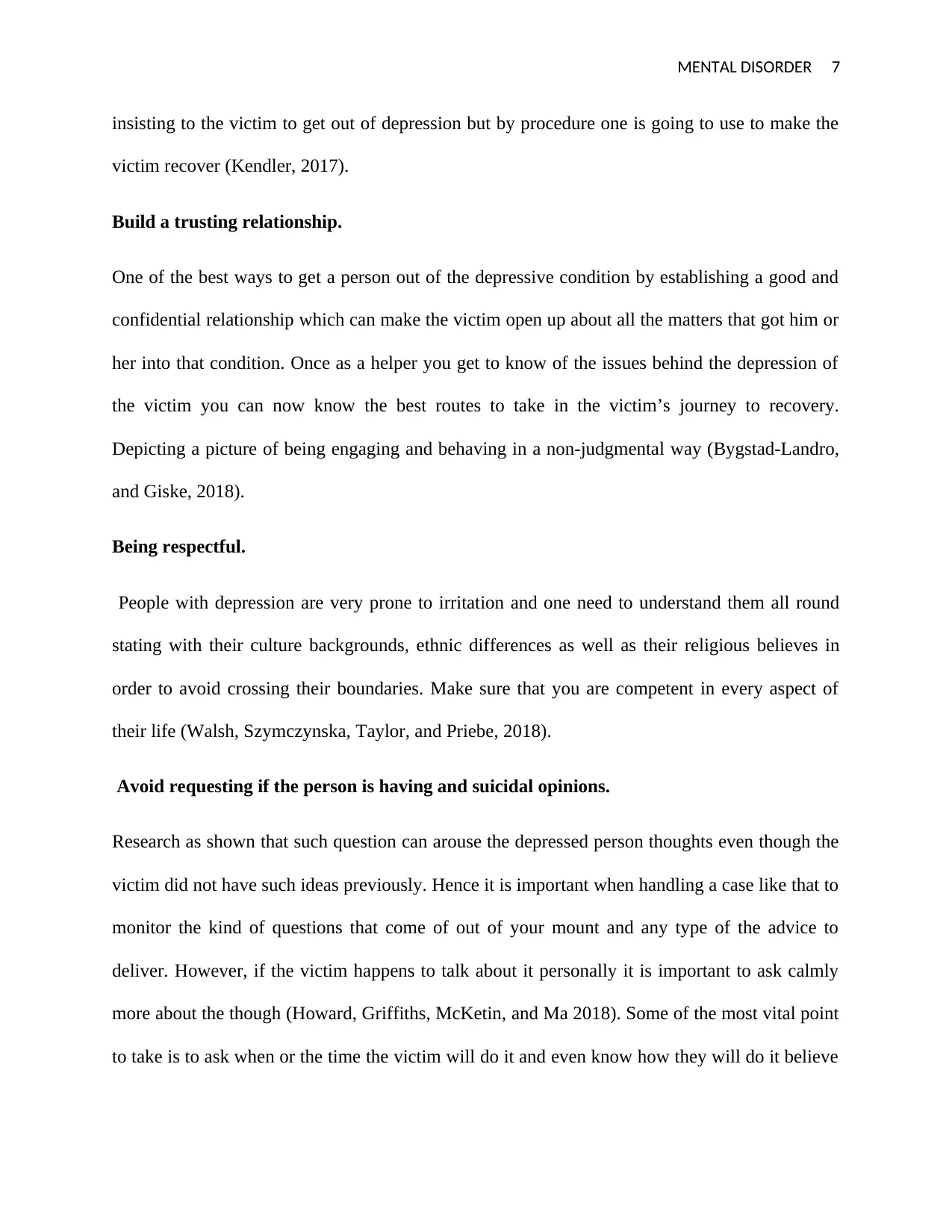
MENTAL DISORDER 7
insisting to the victim to get out of depression but by procedure one is going to use to make the
victim recover (Kendler, 2017).
Build a trusting relationship.
One of the best ways to get a person out of the depressive condition by establishing a good and
confidential relationship which can make the victim open up about all the matters that got him or
her into that condition. Once as a helper you get to know of the issues behind the depression of
the victim you can now know the best routes to take in the victim’s journey to recovery.
Depicting a picture of being engaging and behaving in a non-judgmental way (Bygstad‐Landro,
and Giske, 2018).
Being respectful.
People with depression are very prone to irritation and one need to understand them all round
stating with their culture backgrounds, ethnic differences as well as their religious believes in
order to avoid crossing their boundaries. Make sure that you are competent in every aspect of
their life (Walsh, Szymczynska, Taylor, and Priebe, 2018).
Avoid requesting if the person is having and suicidal opinions.
Research as shown that such question can arouse the depressed person thoughts even though the
victim did not have such ideas previously. Hence it is important when handling a case like that to
monitor the kind of questions that come of out of your mount and any type of the advice to
deliver. However, if the victim happens to talk about it personally it is important to ask calmly
more about the though (Howard, Griffiths, McKetin, and Ma 2018). Some of the most vital point
to take is to ask when or the time the victim will do it and even know how they will do it believe
insisting to the victim to get out of depression but by procedure one is going to use to make the
victim recover (Kendler, 2017).
Build a trusting relationship.
One of the best ways to get a person out of the depressive condition by establishing a good and
confidential relationship which can make the victim open up about all the matters that got him or
her into that condition. Once as a helper you get to know of the issues behind the depression of
the victim you can now know the best routes to take in the victim’s journey to recovery.
Depicting a picture of being engaging and behaving in a non-judgmental way (Bygstad‐Landro,
and Giske, 2018).
Being respectful.
People with depression are very prone to irritation and one need to understand them all round
stating with their culture backgrounds, ethnic differences as well as their religious believes in
order to avoid crossing their boundaries. Make sure that you are competent in every aspect of
their life (Walsh, Szymczynska, Taylor, and Priebe, 2018).
Avoid requesting if the person is having and suicidal opinions.
Research as shown that such question can arouse the depressed person thoughts even though the
victim did not have such ideas previously. Hence it is important when handling a case like that to
monitor the kind of questions that come of out of your mount and any type of the advice to
deliver. However, if the victim happens to talk about it personally it is important to ask calmly
more about the though (Howard, Griffiths, McKetin, and Ma 2018). Some of the most vital point
to take is to ask when or the time the victim will do it and even know how they will do it believe
Paraphrase This Document
Need a fresh take? Get an instant paraphrase of this document with our AI Paraphraser
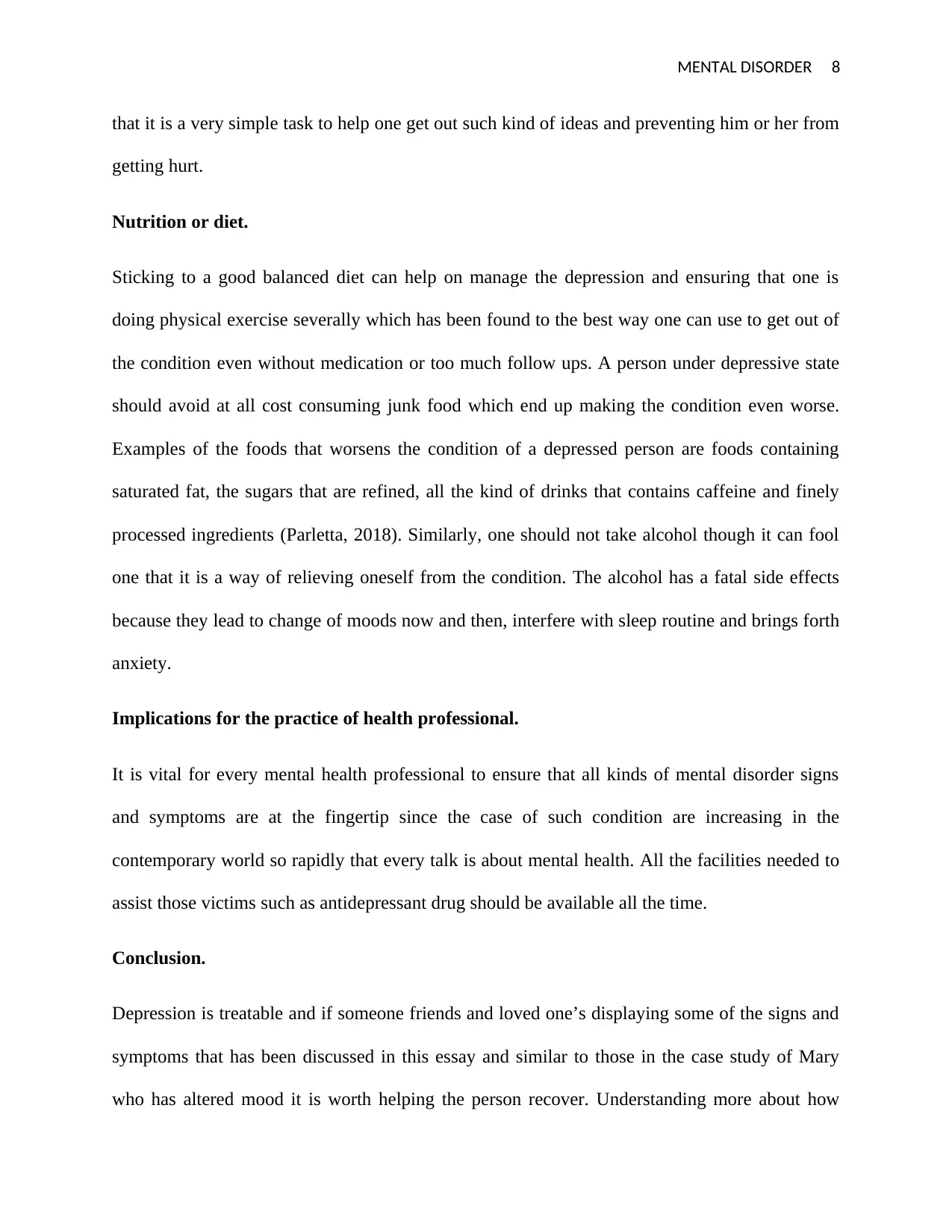
MENTAL DISORDER 8
that it is a very simple task to help one get out such kind of ideas and preventing him or her from
getting hurt.
Nutrition or diet.
Sticking to a good balanced diet can help on manage the depression and ensuring that one is
doing physical exercise severally which has been found to the best way one can use to get out of
the condition even without medication or too much follow ups. A person under depressive state
should avoid at all cost consuming junk food which end up making the condition even worse.
Examples of the foods that worsens the condition of a depressed person are foods containing
saturated fat, the sugars that are refined, all the kind of drinks that contains caffeine and finely
processed ingredients (Parletta, 2018). Similarly, one should not take alcohol though it can fool
one that it is a way of relieving oneself from the condition. The alcohol has a fatal side effects
because they lead to change of moods now and then, interfere with sleep routine and brings forth
anxiety.
Implications for the practice of health professional.
It is vital for every mental health professional to ensure that all kinds of mental disorder signs
and symptoms are at the fingertip since the case of such condition are increasing in the
contemporary world so rapidly that every talk is about mental health. All the facilities needed to
assist those victims such as antidepressant drug should be available all the time.
Conclusion.
Depression is treatable and if someone friends and loved one’s displaying some of the signs and
symptoms that has been discussed in this essay and similar to those in the case study of Mary
who has altered mood it is worth helping the person recover. Understanding more about how
that it is a very simple task to help one get out such kind of ideas and preventing him or her from
getting hurt.
Nutrition or diet.
Sticking to a good balanced diet can help on manage the depression and ensuring that one is
doing physical exercise severally which has been found to the best way one can use to get out of
the condition even without medication or too much follow ups. A person under depressive state
should avoid at all cost consuming junk food which end up making the condition even worse.
Examples of the foods that worsens the condition of a depressed person are foods containing
saturated fat, the sugars that are refined, all the kind of drinks that contains caffeine and finely
processed ingredients (Parletta, 2018). Similarly, one should not take alcohol though it can fool
one that it is a way of relieving oneself from the condition. The alcohol has a fatal side effects
because they lead to change of moods now and then, interfere with sleep routine and brings forth
anxiety.
Implications for the practice of health professional.
It is vital for every mental health professional to ensure that all kinds of mental disorder signs
and symptoms are at the fingertip since the case of such condition are increasing in the
contemporary world so rapidly that every talk is about mental health. All the facilities needed to
assist those victims such as antidepressant drug should be available all the time.
Conclusion.
Depression is treatable and if someone friends and loved one’s displaying some of the signs and
symptoms that has been discussed in this essay and similar to those in the case study of Mary
who has altered mood it is worth helping the person recover. Understanding more about how
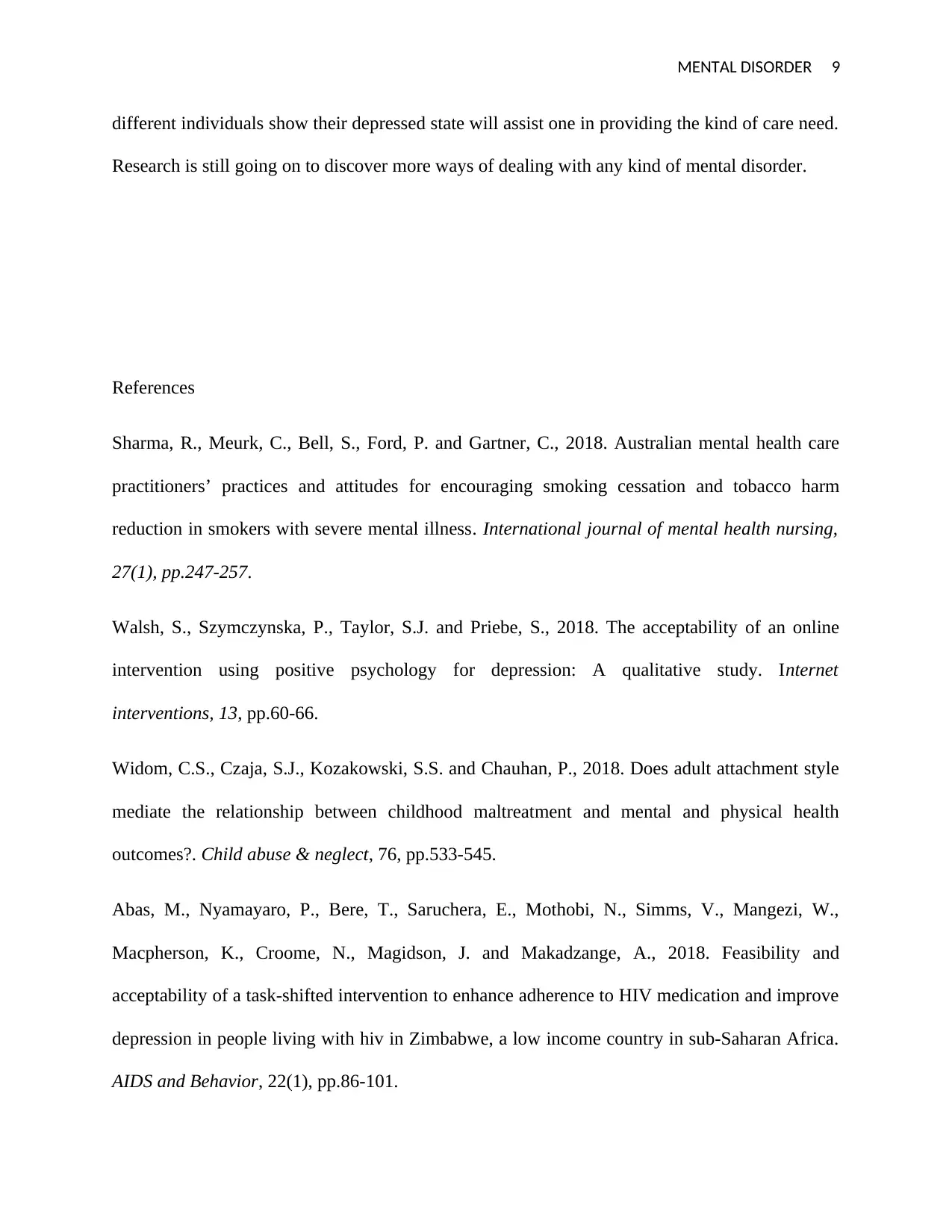
MENTAL DISORDER 9
different individuals show their depressed state will assist one in providing the kind of care need.
Research is still going on to discover more ways of dealing with any kind of mental disorder.
References
Sharma, R., Meurk, C., Bell, S., Ford, P. and Gartner, C., 2018. Australian mental health care
practitioners’ practices and attitudes for encouraging smoking cessation and tobacco harm
reduction in smokers with severe mental illness. International journal of mental health nursing,
27(1), pp.247-257.
Walsh, S., Szymczynska, P., Taylor, S.J. and Priebe, S., 2018. The acceptability of an online
intervention using positive psychology for depression: A qualitative study. Internet
interventions, 13, pp.60-66.
Widom, C.S., Czaja, S.J., Kozakowski, S.S. and Chauhan, P., 2018. Does adult attachment style
mediate the relationship between childhood maltreatment and mental and physical health
outcomes?. Child abuse & neglect, 76, pp.533-545.
Abas, M., Nyamayaro, P., Bere, T., Saruchera, E., Mothobi, N., Simms, V., Mangezi, W.,
Macpherson, K., Croome, N., Magidson, J. and Makadzange, A., 2018. Feasibility and
acceptability of a task-shifted intervention to enhance adherence to HIV medication and improve
depression in people living with hiv in Zimbabwe, a low income country in sub-Saharan Africa.
AIDS and Behavior, 22(1), pp.86-101.
different individuals show their depressed state will assist one in providing the kind of care need.
Research is still going on to discover more ways of dealing with any kind of mental disorder.
References
Sharma, R., Meurk, C., Bell, S., Ford, P. and Gartner, C., 2018. Australian mental health care
practitioners’ practices and attitudes for encouraging smoking cessation and tobacco harm
reduction in smokers with severe mental illness. International journal of mental health nursing,
27(1), pp.247-257.
Walsh, S., Szymczynska, P., Taylor, S.J. and Priebe, S., 2018. The acceptability of an online
intervention using positive psychology for depression: A qualitative study. Internet
interventions, 13, pp.60-66.
Widom, C.S., Czaja, S.J., Kozakowski, S.S. and Chauhan, P., 2018. Does adult attachment style
mediate the relationship between childhood maltreatment and mental and physical health
outcomes?. Child abuse & neglect, 76, pp.533-545.
Abas, M., Nyamayaro, P., Bere, T., Saruchera, E., Mothobi, N., Simms, V., Mangezi, W.,
Macpherson, K., Croome, N., Magidson, J. and Makadzange, A., 2018. Feasibility and
acceptability of a task-shifted intervention to enhance adherence to HIV medication and improve
depression in people living with hiv in Zimbabwe, a low income country in sub-Saharan Africa.
AIDS and Behavior, 22(1), pp.86-101.
⊘ This is a preview!⊘
Do you want full access?
Subscribe today to unlock all pages.

Trusted by 1+ million students worldwide
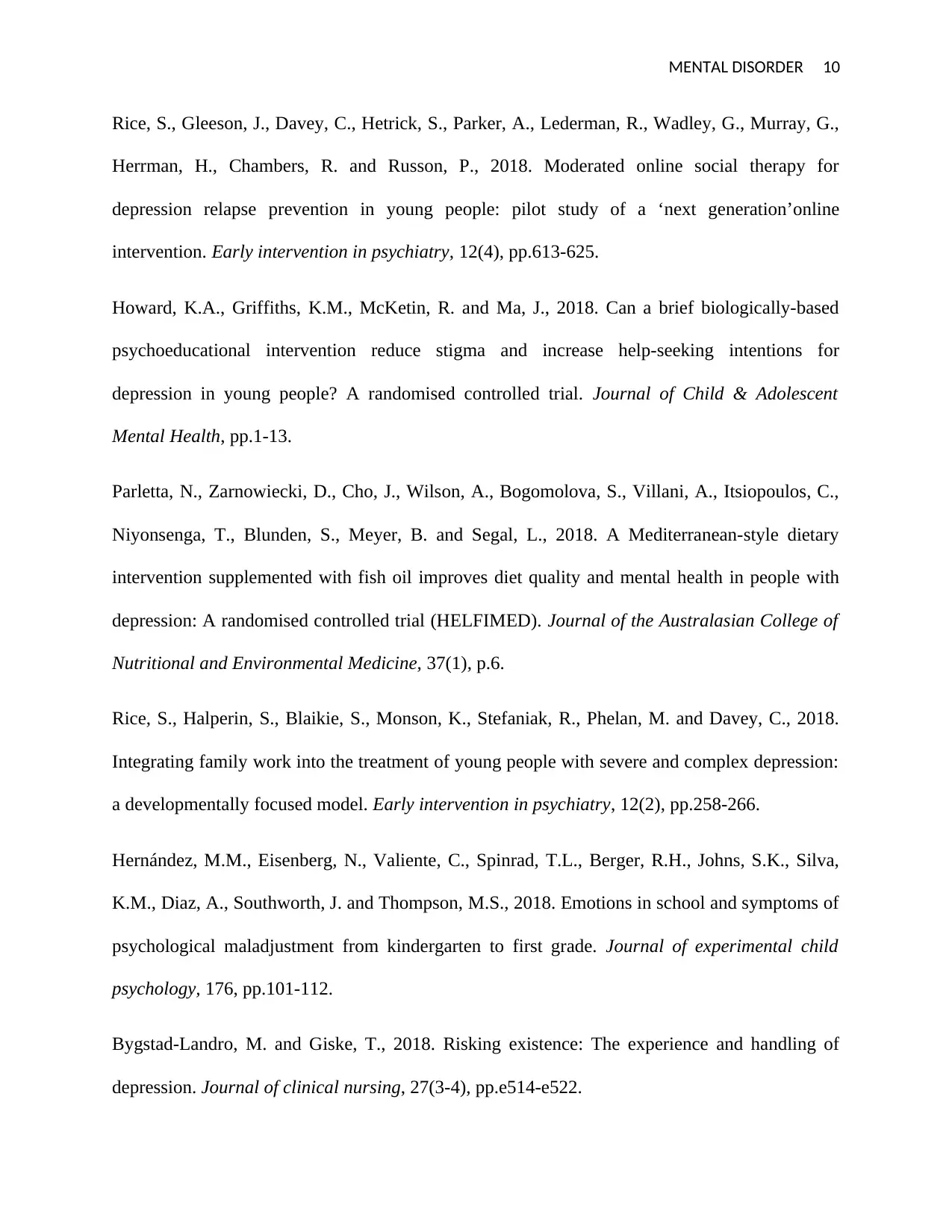
MENTAL DISORDER 10
Rice, S., Gleeson, J., Davey, C., Hetrick, S., Parker, A., Lederman, R., Wadley, G., Murray, G.,
Herrman, H., Chambers, R. and Russon, P., 2018. Moderated online social therapy for
depression relapse prevention in young people: pilot study of a ‘next generation’online
intervention. Early intervention in psychiatry, 12(4), pp.613-625.
Howard, K.A., Griffiths, K.M., McKetin, R. and Ma, J., 2018. Can a brief biologically-based
psychoeducational intervention reduce stigma and increase help-seeking intentions for
depression in young people? A randomised controlled trial. Journal of Child & Adolescent
Mental Health, pp.1-13.
Parletta, N., Zarnowiecki, D., Cho, J., Wilson, A., Bogomolova, S., Villani, A., Itsiopoulos, C.,
Niyonsenga, T., Blunden, S., Meyer, B. and Segal, L., 2018. A Mediterranean-style dietary
intervention supplemented with fish oil improves diet quality and mental health in people with
depression: A randomised controlled trial (HELFIMED). Journal of the Australasian College of
Nutritional and Environmental Medicine, 37(1), p.6.
Rice, S., Halperin, S., Blaikie, S., Monson, K., Stefaniak, R., Phelan, M. and Davey, C., 2018.
Integrating family work into the treatment of young people with severe and complex depression:
a developmentally focused model. Early intervention in psychiatry, 12(2), pp.258-266.
Hernández, M.M., Eisenberg, N., Valiente, C., Spinrad, T.L., Berger, R.H., Johns, S.K., Silva,
K.M., Diaz, A., Southworth, J. and Thompson, M.S., 2018. Emotions in school and symptoms of
psychological maladjustment from kindergarten to first grade. Journal of experimental child
psychology, 176, pp.101-112.
Bygstad‐Landro, M. and Giske, T., 2018. Risking existence: The experience and handling of
depression. Journal of clinical nursing, 27(3-4), pp.e514-e522.
Rice, S., Gleeson, J., Davey, C., Hetrick, S., Parker, A., Lederman, R., Wadley, G., Murray, G.,
Herrman, H., Chambers, R. and Russon, P., 2018. Moderated online social therapy for
depression relapse prevention in young people: pilot study of a ‘next generation’online
intervention. Early intervention in psychiatry, 12(4), pp.613-625.
Howard, K.A., Griffiths, K.M., McKetin, R. and Ma, J., 2018. Can a brief biologically-based
psychoeducational intervention reduce stigma and increase help-seeking intentions for
depression in young people? A randomised controlled trial. Journal of Child & Adolescent
Mental Health, pp.1-13.
Parletta, N., Zarnowiecki, D., Cho, J., Wilson, A., Bogomolova, S., Villani, A., Itsiopoulos, C.,
Niyonsenga, T., Blunden, S., Meyer, B. and Segal, L., 2018. A Mediterranean-style dietary
intervention supplemented with fish oil improves diet quality and mental health in people with
depression: A randomised controlled trial (HELFIMED). Journal of the Australasian College of
Nutritional and Environmental Medicine, 37(1), p.6.
Rice, S., Halperin, S., Blaikie, S., Monson, K., Stefaniak, R., Phelan, M. and Davey, C., 2018.
Integrating family work into the treatment of young people with severe and complex depression:
a developmentally focused model. Early intervention in psychiatry, 12(2), pp.258-266.
Hernández, M.M., Eisenberg, N., Valiente, C., Spinrad, T.L., Berger, R.H., Johns, S.K., Silva,
K.M., Diaz, A., Southworth, J. and Thompson, M.S., 2018. Emotions in school and symptoms of
psychological maladjustment from kindergarten to first grade. Journal of experimental child
psychology, 176, pp.101-112.
Bygstad‐Landro, M. and Giske, T., 2018. Risking existence: The experience and handling of
depression. Journal of clinical nursing, 27(3-4), pp.e514-e522.
Paraphrase This Document
Need a fresh take? Get an instant paraphrase of this document with our AI Paraphraser
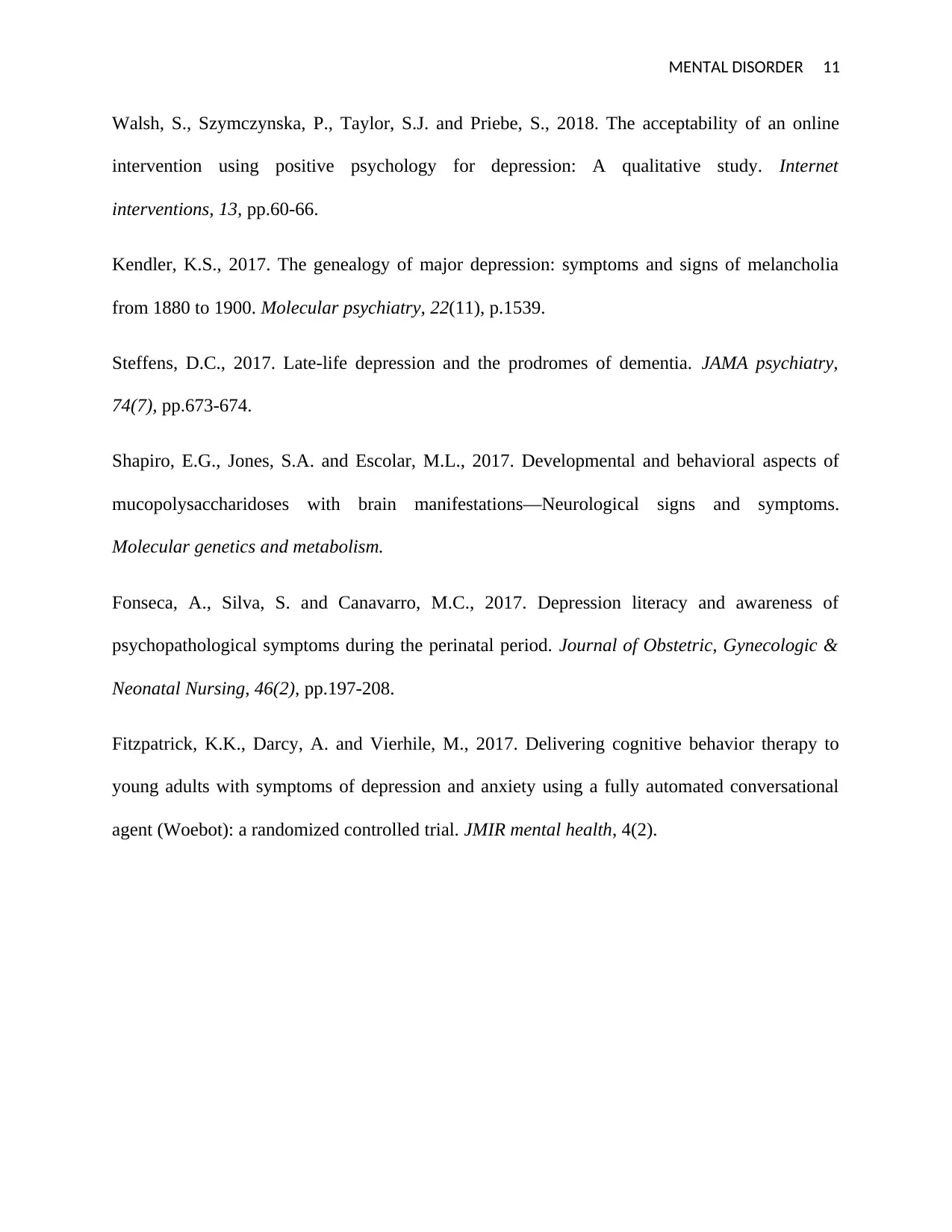
MENTAL DISORDER 11
Walsh, S., Szymczynska, P., Taylor, S.J. and Priebe, S., 2018. The acceptability of an online
intervention using positive psychology for depression: A qualitative study. Internet
interventions, 13, pp.60-66.
Kendler, K.S., 2017. The genealogy of major depression: symptoms and signs of melancholia
from 1880 to 1900. Molecular psychiatry, 22(11), p.1539.
Steffens, D.C., 2017. Late-life depression and the prodromes of dementia. JAMA psychiatry,
74(7), pp.673-674.
Shapiro, E.G., Jones, S.A. and Escolar, M.L., 2017. Developmental and behavioral aspects of
mucopolysaccharidoses with brain manifestations—Neurological signs and symptoms.
Molecular genetics and metabolism.
Fonseca, A., Silva, S. and Canavarro, M.C., 2017. Depression literacy and awareness of
psychopathological symptoms during the perinatal period. Journal of Obstetric, Gynecologic &
Neonatal Nursing, 46(2), pp.197-208.
Fitzpatrick, K.K., Darcy, A. and Vierhile, M., 2017. Delivering cognitive behavior therapy to
young adults with symptoms of depression and anxiety using a fully automated conversational
agent (Woebot): a randomized controlled trial. JMIR mental health, 4(2).
Walsh, S., Szymczynska, P., Taylor, S.J. and Priebe, S., 2018. The acceptability of an online
intervention using positive psychology for depression: A qualitative study. Internet
interventions, 13, pp.60-66.
Kendler, K.S., 2017. The genealogy of major depression: symptoms and signs of melancholia
from 1880 to 1900. Molecular psychiatry, 22(11), p.1539.
Steffens, D.C., 2017. Late-life depression and the prodromes of dementia. JAMA psychiatry,
74(7), pp.673-674.
Shapiro, E.G., Jones, S.A. and Escolar, M.L., 2017. Developmental and behavioral aspects of
mucopolysaccharidoses with brain manifestations—Neurological signs and symptoms.
Molecular genetics and metabolism.
Fonseca, A., Silva, S. and Canavarro, M.C., 2017. Depression literacy and awareness of
psychopathological symptoms during the perinatal period. Journal of Obstetric, Gynecologic &
Neonatal Nursing, 46(2), pp.197-208.
Fitzpatrick, K.K., Darcy, A. and Vierhile, M., 2017. Delivering cognitive behavior therapy to
young adults with symptoms of depression and anxiety using a fully automated conversational
agent (Woebot): a randomized controlled trial. JMIR mental health, 4(2).
1 out of 11
Related Documents
Your All-in-One AI-Powered Toolkit for Academic Success.
+13062052269
info@desklib.com
Available 24*7 on WhatsApp / Email
![[object Object]](/_next/static/media/star-bottom.7253800d.svg)
Unlock your academic potential
Copyright © 2020–2025 A2Z Services. All Rights Reserved. Developed and managed by ZUCOL.





